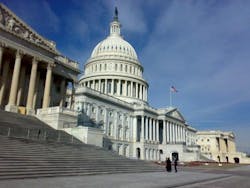Democrats and Republicans agree that spending on roads, bridges, broadband, water and other physical infrastructure is long overdue. Published reports suggest that early battle lines are being drawn around determining how to pay and for what.
As the Biden administration prepares to move its $2.3 trillion proposal through the law-making process, two issues have risen as contentious to consensus: taxes and non-infrastructure aspects.
The administration said yesterday that gas tax increases would not be considered as a method of paying for the program. According to The Hill, the White House press secretary said the gas tax is “not being discussed.”
In addition, Republicans are signaling that the administration’s plan to pay for the proposal with corporate taxes and changes in the tax cuts law passed in 2017 would draw resistance.
The price tag is also causing some to call for separating infrastructure from other parts of the program not historically defined as “infrastructure.” Most notable are spending proposals aimed at education and housing, as well as environmental plans that some are defining as parts of The Green New Deal floated during the run up to the presidential election last fall.





